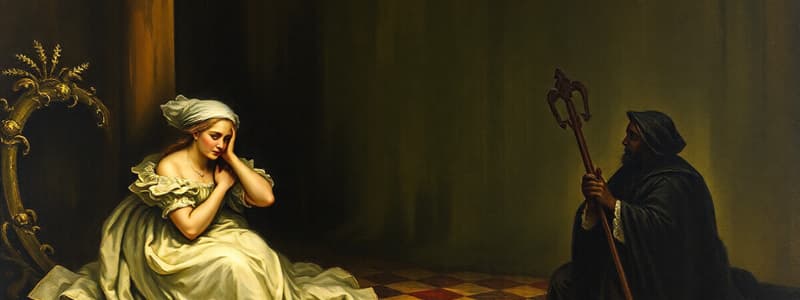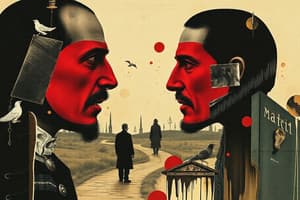Podcast
Questions and Answers
What theme in Macbeth highlights the struggle between personal desires and predetermined outcomes?
What theme in Macbeth highlights the struggle between personal desires and predetermined outcomes?
- Fate vs. Free Will (correct)
- Appearance vs. Reality
- Ambition and Power
- Guilt and Conscience
Which of the following is a key symbol of guilt in Macbeth?
Which of the following is a key symbol of guilt in Macbeth?
- The Crown
- The Witches' Cauldron
- The Moon
- The Bloody Dagger (correct)
How does Macbeth exemplify the characteristics of a tragic hero?
How does Macbeth exemplify the characteristics of a tragic hero?
- His ambition leads to his downfall. (correct)
- He faces a minor conflict.
- He is guided by a mentor figure.
- He always succeeds in his plans.
What aspect of Macbeth creates suspense for the audience through dramatic irony?
What aspect of Macbeth creates suspense for the audience through dramatic irony?
In what way does Macbeth differ from the archetypal hero's journey?
In what way does Macbeth differ from the archetypal hero's journey?
Which of the following options is NOT a focus area while studying Macbeth?
Which of the following options is NOT a focus area while studying Macbeth?
What role does the concept of idealization play in the hero's journey framework?
What role does the concept of idealization play in the hero's journey framework?
Which character in Macbeth serves as a primary external conflict for Macbeth?
Which character in Macbeth serves as a primary external conflict for Macbeth?
What narrative structure typically moves from disorder to harmony?
What narrative structure typically moves from disorder to harmony?
What does the term hamartia refer to in the context of a tragic hero?
What does the term hamartia refer to in the context of a tragic hero?
What type of irony occurs when the audience has more information than the characters?
What type of irony occurs when the audience has more information than the characters?
Which symbol in Macbeth represents guilt and ambition?
Which symbol in Macbeth represents guilt and ambition?
What is an archetype in literature?
What is an archetype in literature?
What does the concept of catharsis describe in literature?
What does the concept of catharsis describe in literature?
Which motif is commonly associated with Macbeth and symbolizes violence and guilt?
Which motif is commonly associated with Macbeth and symbolizes violence and guilt?
What does the term verbal irony convey?
What does the term verbal irony convey?
In 'Moon of the Crusted Snow,' what do the elders represent?
In 'Moon of the Crusted Snow,' what do the elders represent?
What role does a tragic hero play in a tragedy?
What role does a tragic hero play in a tragedy?
What is a key characteristic that differentiates Macbeth from a comedy?
What is a key characteristic that differentiates Macbeth from a comedy?
Which theme is prevalent in the play Macbeth?
Which theme is prevalent in the play Macbeth?
What represents the consequences of abandoning community values in Moon of the Crusted Snow?
What represents the consequences of abandoning community values in Moon of the Crusted Snow?
What does the False Great Chain of Being illustrate in relation to Macbeth's actions?
What does the False Great Chain of Being illustrate in relation to Macbeth's actions?
What does the Windigo symbolize in the cultural context of Anishinaabe stories?
What does the Windigo symbolize in the cultural context of Anishinaabe stories?
How does Macbeth's tone contribute to its classification as a tragedy?
How does Macbeth's tone contribute to its classification as a tragedy?
What ultimately restores order at the end of Macbeth?
What ultimately restores order at the end of Macbeth?
Which of the following is NOT a characteristic of a comedy as outlined in the content?
Which of the following is NOT a characteristic of a comedy as outlined in the content?
What crucial element does the Windigo reflect in Moon of the Crusted Snow?
What crucial element does the Windigo reflect in Moon of the Crusted Snow?
In what way does Macbeth’s ambition lead to chaos?
In what way does Macbeth’s ambition lead to chaos?
Which statement accurately describes the tone of Macbeth in contrast to a comedy?
Which statement accurately describes the tone of Macbeth in contrast to a comedy?
What effect does Macbeth’s attempt to change his fate have on the story?
What effect does Macbeth’s attempt to change his fate have on the story?
What is the moral lesson illustrated by Macbeth regarding ambition?
What is the moral lesson illustrated by Macbeth regarding ambition?
What does the term 'pathetic fallacy' refer to in literary terms?
What does the term 'pathetic fallacy' refer to in literary terms?
Which aspect of Macbeth emphasizes his moral corruption?
Which aspect of Macbeth emphasizes his moral corruption?
Flashcards
FANBOYS
FANBOYS
A group of conjunctions used to join clauses in a sentence, they are: For, And, Nor, But, Or, Yet, So
The Season of Shakespeare
The Season of Shakespeare
The study and analysis of William Shakespeare's works, focusing on themes, characters, and language in his plays
Tragic Hero
Tragic Hero
A character who has a fatal flaw that leads to their downfall, often embodying flaws in humanity
Ambition and Power in Macbeth
Ambition and Power in Macbeth
Signup and view all the flashcards
Fate vs. Free Will in Macbeth
Fate vs. Free Will in Macbeth
Signup and view all the flashcards
Guilt and Conscience in Macbeth
Guilt and Conscience in Macbeth
Signup and view all the flashcards
Appearance vs. Reality in Macbeth
Appearance vs. Reality in Macbeth
Signup and view all the flashcards
The Hero's Journey (Romance Archetype)
The Hero's Journey (Romance Archetype)
Signup and view all the flashcards
Hyperbole
Hyperbole
Signup and view all the flashcards
Paradox
Paradox
Signup and view all the flashcards
Catharsis
Catharsis
Signup and view all the flashcards
Verbal irony
Verbal irony
Signup and view all the flashcards
Situational irony
Situational irony
Signup and view all the flashcards
Dramatic irony
Dramatic irony
Signup and view all the flashcards
Tragedy
Tragedy
Signup and view all the flashcards
Hamartia
Hamartia
Signup and view all the flashcards
Comedy (archetypal)
Comedy (archetypal)
Signup and view all the flashcards
Tragedy (archetype)
Tragedy (archetype)
Signup and view all the flashcards
Parody
Parody
Signup and view all the flashcards
Pathetic fallacy
Pathetic fallacy
Signup and view all the flashcards
Equivocation
Equivocation
Signup and view all the flashcards
Great Chain of Being
Great Chain of Being
Signup and view all the flashcards
False Great Chain of Being
False Great Chain of Being
Signup and view all the flashcards
True Great Chain of Being
True Great Chain of Being
Signup and view all the flashcards
Windigo
Windigo
Signup and view all the flashcards
Significance of the Windigo
Significance of the Windigo
Signup and view all the flashcards
Cultural Meaning of the Windigo
Cultural Meaning of the Windigo
Signup and view all the flashcards
Windigo's Representation in the Novel
Windigo's Representation in the Novel
Signup and view all the flashcards
Moral and Thematic Significance of the Windigo
Moral and Thematic Significance of the Windigo
Signup and view all the flashcards
Satire
Satire
Signup and view all the flashcards
Study Notes
Shakespeare's Macbeth: Key Themes and Concepts
- Themes: Ambition and Power (destructive effects), Fate vs. Free Will (witches' prophecies), Guilt and Conscience (Macbeth and Lady Macbeth's mental state), Appearance vs. Reality (deception).
- Tragic Hero: Macbeth embodies this archetype; his fatal flaw (hamartia) is ambition and moral weakness, leading to his downfall.
- Symbolism: Blood represents guilt and violence, the Bloody Dagger signifies Macbeth's guilt and violent path, and apparitions symbolize fate and manipulation.
- Dramatic Irony: The audience knows Macbeth's fate from the witches' prophecies, increasing suspense.
- Conflict: Internal conflict arises from Macbeth's struggle with conscience and ambition; external conflict is between Macbeth and Macduff, and the consequences of Macbeth's actions.
Macbeth: Non-Comedy Characteristics
- Happy Ending Absence: Comedies typically resolve with harmony and positive outcomes; Macbeth ends tragically with death and destruction.
- Protagonist's Downfall: In comedies, characters overcome adversity; Macbeth's ambition and guilt lead to his demise.
- Dark Tone: Comedies are lighthearted and optimistic; Macbeth's tone is dark and ominous, focusing on death, guilt, and betrayal.
- Conflict Resolution: Comedic conflicts benefit most characters; Macbeth's resolution is Macbeth's defeat, a bittersweet outcome for the play.
- Themes: Comedies explore love and harmony; Macbeth explores ambition, fate, and moral corruption.
Windigo Significance in "Moon of the Crusted Snow"
- Cultural Symbol: In Anishinaabe stories, the Windigo represents cannibalism, greed, and loss of humanity. It warns against selfishness and excess.
- Novel Representation: The Windigo is both literal and metaphorical, reflecting the breakdown of social order and humanity during a crisis. Characters like Justin Scott embody the Windigo spirit through selfish and violent acts.
- Moral Lesson: The Windigo cautions against abandoning community values and succumbing to greed and fear during difficult times.
Great Chain of Being: True and False Applications
- True Chain: People adhere to their pre-ordained positions in the hierarchy; disrupting this order results in chaos and punishment.
- False Chain: People try to ascend the hierarchy through ambition or force; this always has dire consequences.
- Macbeth Example (False): Macbeth's desire for higher status by killing the King violates the hierarchical order, leading to his downfall.
- Macbeth Example (True): Macbeth's actions cause chaos and destruction; order is restored when Malcolm takes the throne.
Literary Terms and Archetypes (Macbeth and Moon of the Crusted Snow)
-
Satire: Humor/irony to criticize human folly/social issues, often to provoke change.
-
Parody: Imitation of a work to create a comedic, critical effect, often exaggerating characteristics.
-
Pathetic Fallacy: Attributing human emotions to nature, reflecting a character's mood, e.g., stormy weather reflecting Macbeth's turmoil.
-
Equivocation: Ambiguous statements to conceal truth, e.g., witches' prophecies.
-
Great Chain of Being: Hierarchical structure, natural order can be disrupted, which has consequences.
-
Hyperbole: Extreme exaggeration for emphasis.
-
Paradox: Contradictory statements, e.g., "less is more."
-
Catharsis: Audience emotional release at a tragedy's resolution.
-
Verbal Irony: Saying the opposite of what's meant for humor/sarcasm.
-
Situational Irony: Outcome is the opposite of expectations.
-
Dramatic Irony: Audience knows what characters don't, building tension.
-
Tragedy: Downfall of a noble character due to a fatal flaw.
-
Tragic Hero: Noble character, downfall owing to a tragic flaw.
-
Hamartia: Tragic flaw causing downfall.
-
Comedy: Narrative moving from disorder to harmony, a happy ending.
-
Archetype: Universal symbol or character type.
-
Romance: Heroic quest, love, often idealized.
-
Theme: Central idea or message in a work.
-
Allegory: Story where characters/events symbolize abstract concepts.
-
Motif: Recurring element, image, or idea in a work.
-
FANBOYS: Coordinating conjunctions (For, And, Nor, But, Or, Yet, So).
-
SYMBOLS/Terms:
-
Elders: Figures of wisdom, tradition, in "Moon," they represent Indigenous culture preservation.
-
Windigo: In "Moon," symbolizes greed, corruption, social breakdown.
-
The Bloody Dagger: Macbeth's guilt, moral corruption, paranoia.
-
Apocalypse: In "Moon," societal collapse, potential renewal from Indigenous knowledge.
-
The Apparitions: Manipulation, fate, deceptive prophecies, driving Macbeth's downfall.
-
Dreams: Reveal subconscious fears, guilt (Lady Macbeth sleepwalking).
-
Blood: Guilt, violence, consequences of ambition (Macbeth).
Studying That Suits You
Use AI to generate personalized quizzes and flashcards to suit your learning preferences.




